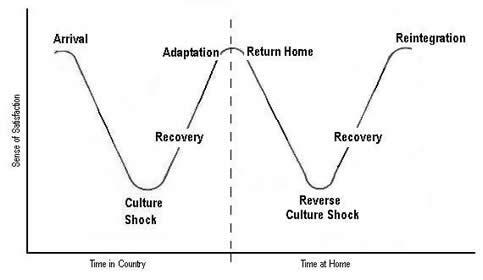
“We shall not cease from exploration and the end of all our exploring will be to arrive where we started and know the place for the first time.” --T.S. Eliot
Now What?
10 Tips on Re-Adjusting after your Study Abroad Experience
1. Prepare for Re entry before you return home:
- Keep a blog so your friends and family get to hear about your expereience in fun digestable chunks.
- Make sure you have contact information for people you do want to stay in touch with.
- Complete the worksheet A Thoughtful Return.
2. Give yourself time to process your experience:
- Keep a journal or create a scrapbook while your memories are fresh.
- Do anything that allows you to reflect upon your experience.
3. Realize that friends and family may not understand what you are going through.
4. Stay positive and active:
- There will be some frustrations and disappointments but work through it with the same enthusiasm that you brought to your overseas experience.

5. Stay Connected:
- Stay in touch with friends from your host country.
- Talk to other students or faculty who have been abroad.
- Keep learning the language of your host country.
- Join the VIU Education Abroad Facebook Page.
6. Share your story:
- Organize a food and photos night for your family and friends.
- Work with the Education Abroad Office or your program department to organize a presentation of your experience abroad (Opportunities during International Education Week).
- Write an article for a newsletter or local newspaper.
7. Put your new skills to work:
- Talk to the career centre or come to a fall workshop through Education Abroad about how to identify your new skill set and how to promote these new skills to get work during and after graduation.
- Volunteer at the Faculty of International Education or a community organization.
- Take courses where you can directly apply what you have learned.
- Talk with your instructors about independent studies that continue themes addressed in your time abroad.
8. Keep your cultural sensitivity:
- Observe Canadian culture the same way you observed the foreign culture.
- Consider what you like about Canada and what you want to keep from the culture you experienced abroad.
9. Do what you need to maintain a spiritual balance:
- Go for long walks.
- Listen to your favourite music.
- Meditate.
10. If you do find reentry particularly traumatic, seek support from a counseling service.
Give Back & Get Involved
For many students, it is inspiring to come home and give back to the global community.
Join the Exchange Agent program and share your experiences with prospective students, complete your Global Citizens Network Activities and help out with international events and programs on campus that benefit the international student community.
Online Forums
We are always happy to hear your stories and see your pictures at the Education Abroad Office. Also if you have any questions about re-entry or want to set up an appointment for a Re-Entry meeting, please do not hesitate to contact us!
What’s Up with Culture? Online Re Entry Workshop
It is important to take the time to reflect on your experiences, growth, challenges and achievements.
- Online Cultural Training Resource for Study Abroad (Click on Module 2)
Re-Entry Resources
Explore these additional resources for reflecting on and learning from your experiences abroad and upon your return.
Upon your return to Canada, you may find many things are different from how you left them. You may be inspired to share your experiences, give back to the Education Abroad community, and you may find that you are more critical of Canada, and view your host country in a more favorable light.
The emotions associated with Reverse Culture Shock can be unexpected yet it is common and completely normal for returnees to experience these feelings.
What can be so disorienting for recent returnees is the fact that they may not expect reverse culture shock, because, well… you’re coming home, and everything is the same, right?! The emotions associated with reverse culture shock are often felt more strongly than the culture shock you may have experienced going abroad.
Fortunately there are a lot of things that can be done to help re-adjust to life at home and to “anchor” your experience abroad.
